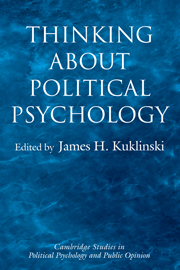Book contents
- Frontmatter
- Contents
- List of Contributors
- Introduction: Political Psychology and the Study of Politics
- Part I Defining Political Psychology
- Part II Theory and Research
- Part III The Psychology–Politics Nexus
- Part IV Political Psychology and Aggregate Opinion
- 8 The Micro Foundations of Mood
- 9 From Denial to Extenuation (and Finally Beyond): Political Sophistication and Citizen Performance
- 10 Political Psychology and the Micro–Macro Gap in Politics
- Index
- Books in the series
9 - From Denial to Extenuation (and Finally Beyond): Political Sophistication and Citizen Performance
Published online by Cambridge University Press: 28 July 2009
- Frontmatter
- Contents
- List of Contributors
- Introduction: Political Psychology and the Study of Politics
- Part I Defining Political Psychology
- Part II Theory and Research
- Part III The Psychology–Politics Nexus
- Part IV Political Psychology and Aggregate Opinion
- 8 The Micro Foundations of Mood
- 9 From Denial to Extenuation (and Finally Beyond): Political Sophistication and Citizen Performance
- 10 Political Psychology and the Micro–Macro Gap in Politics
- Index
- Books in the series
Summary
For a long time now, an extremely large chunk of political psychology has revolved around political sophistication, meaning roughly the extent and organization of an individual's stored political cognition, and more or less equivalent variables. Two other terms having some currency, expertise and cognitive complexity, are synonymous (the former entirely, the latter in its most usual sense). Constraint, a term whose popularity is mercifully fading, has frequently been used to mean the correlations or other statistical patterning of attitudes across individuals but was originally intended and is still sometimes used to mean sophistication's organizational side. Ideology, in certain of its numerous meanings, is also related, an ideology being what someone who is highly sophisticated has. Perhaps the most currently popular term is information, which in its relevant sense is just the complement of constraint in its original sense – the quantity of stored cognition, organization aside. Knowledge, also popular, is the same, except for the additional connotation of accuracy.
In practice, even these last subtle distinctions melt away. A few poor scraps of information do not need or receive much cataloging, while great vast heaps of it cannot be retained without it. It is somewhat easier to find people who have lots of well-organized but frequently incorrect information, a case well illustrated, a few years ago, by the followers of Lyndon Larouche. But this combination too is rare.
- Type
- Chapter
- Information
- Thinking about Political Psychology , pp. 281 - 305Publisher: Cambridge University PressPrint publication year: 2002
- 32
- Cited by

